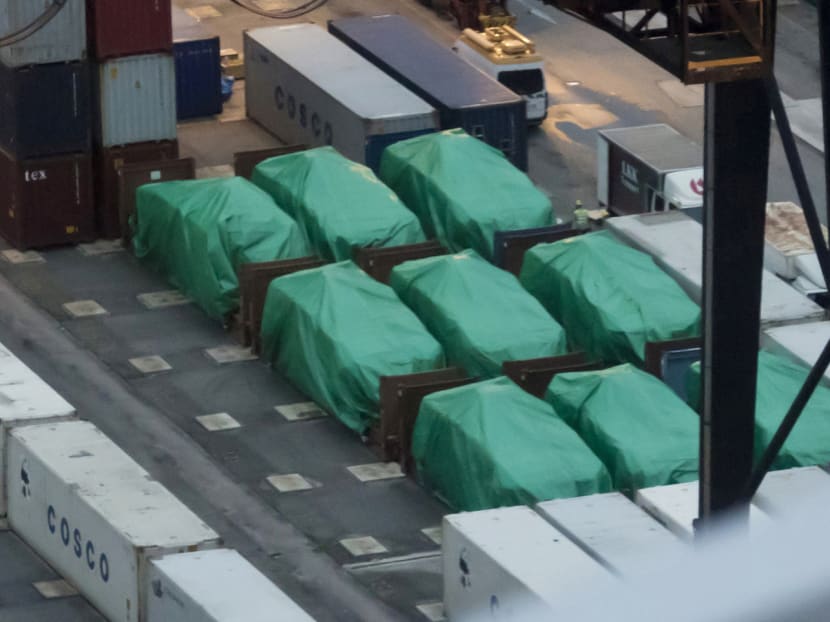Terrex issue is collateral damage from testy US-China ties: Tommy Koh
SINGAPORE — The Republic’s foreign policy has been premised on cultivating close ties with other countries without aligning itself to any superpower, but it may become more difficult to do this as Sino-US relations are very likely to turn confrontational, said Ambassador-at-Large Tommy Koh.

In this photo taken on Nov 24, 2016, Nine eight-wheeled Singapore-made Terrex infantry carrier vehicles are detained at a container terminal in Hong Kong. Photo: AP
SINGAPORE — The Republic’s foreign policy has been premised on cultivating close ties with other countries without aligning itself to any superpower, but it may become more difficult to do this as Sino-US relations are very likely to turn confrontational, said Ambassador-at-Large Tommy Koh.
Speaking as a conference moderator at the Institute of Policy Studies’ (IPS) Singapore Perspectives conference, Professor Koh, said that all countries, including small nations such as Singapore, would be part of the “collateral damage” in such a scenario.
“It narrows the room for small countries like Singapore,” said Prof Koh, who is special adviser to IPS. “It already has a repercussion on us. I think the detention of the nine Terrex vehicles in Hong Kong has to do with the increasingly acrimonious relations across the straits, and between Beijing and Washington.”
Since November, nine Singapore Armed Forces armoured vehicles have been in the custody of the Hong Kong authorities, after being seized en route from Taiwan to Singapore.
Professor Joseph Liow, dean of the S Rajaratnam School of International Studies, a panellist at the session, felt that despite its newly inaugurated President gunning for an “America First” approach, the US is unlikely to withdraw completely from Asia, given that it has much to gain from maintaining its ties with the region.
The Trump administration could “scale back” on its commitment to the region, but since the end of the Cold War between the former Soviet Union and the US, stable Sino-US ties have contributed to a “strategic equilibrium” in East Asia, allowing the region to flourish economically, while keeping the pressures of competition at bay, said Prof Liow.
Bilateral relations have also expanded from trade to discussions on climate change, terrorism and cybersecurity over the years.
“I think that Chinese leaders in private will grudgingly admit that the US has had a restraining hand on Japan and Taiwan in this region,” he said. Even if China wanted to limit US reach, it would not want the US to “entirely disengage” from this region.
Similarly, the US would still benefit from continuous engagement with this region, in terms of economics and security, said Prof Liow.
But he acknowledged that there have been concerns over receding US interest in the region in the wake of the Trump administration, and the growing assertiveness exhibited by China.
Against this backdrop, taking sides would result in a zero-sum game, he added. If taking a stand is inevitable, Singapore would have to weigh national interest with Asean cohesion, and ensure that there would be no interference in domestic politics, he advised.
“If making a choice means making concessions … other states may read the wrong signals or draw the wrong conclusions from our actions — (for example), Singapore is a pushover,” said Prof Liow.






